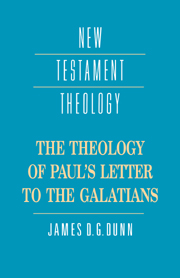Book contents
- Frontmatter
- Contents
- Editor's preface
- Preface
- List of abbreviations
- 1 Introduction
- 2 The make or break issues
- 3 The fundamental agreements
- 4 The heritage of Abraham
- 5 How should the heirs of Abraham live?
- 6 Lesser issues
- 7 The influence of Galatians in Christian thought
- List of further reading
- Index of references
- Index of names
- Index of subjects
7 - The influence of Galatians in Christian thought
Published online by Cambridge University Press: 05 June 2012
- Frontmatter
- Contents
- Editor's preface
- Preface
- List of abbreviations
- 1 Introduction
- 2 The make or break issues
- 3 The fundamental agreements
- 4 The heritage of Abraham
- 5 How should the heirs of Abraham live?
- 6 Lesser issues
- 7 The influence of Galatians in Christian thought
- List of further reading
- Index of references
- Index of names
- Index of subjects
Summary
There are two periods in which Paul's letter to the Galatians has been particularly influential – the early Church, including the New Testament period itself, and the modern period, from the Reformation onwards.
THE EARLY CHURCH
The New Testament period
We have already indicated the strong likelihood that Galatians was one of Paul's earliest letters, one in which he laid out his claim to full apostolic authority for his gospel and his understanding of justification by faith, perhaps for the first time in just these terms, but certainly for the first time in a definitive writing, so far as we know. Within the Pauline corpus, therefore, Galatians has a primary place as the first extant statement of Paul's distinctive theology. We cannot, of course, speak of the influence of Galatians on the rest of Paul's letters – the living Paul was himself the link! But because of its raw, spontaneous character Galatians can be regarded as the closest thing we have to ‘pure paulinism’, and so serve as a pole of comparison by which to measure the subsequent course of Paul's theology.
On the whole the impression is of a fire which flared up on the news from Galatia, but which thereafter burned with a steadier flame. Attempts to interfere in his work by other ‘apostles’ or to impose circumcision on his converts continued to touch a raw nerve and to provoke new outbursts of passionate indignation (2 Cor. 10–13; Phil. 3).
- Type
- Chapter
- Information
- The Theology of Paul's Letter to the Galatians , pp. 133 - 145Publisher: Cambridge University PressPrint publication year: 1993



